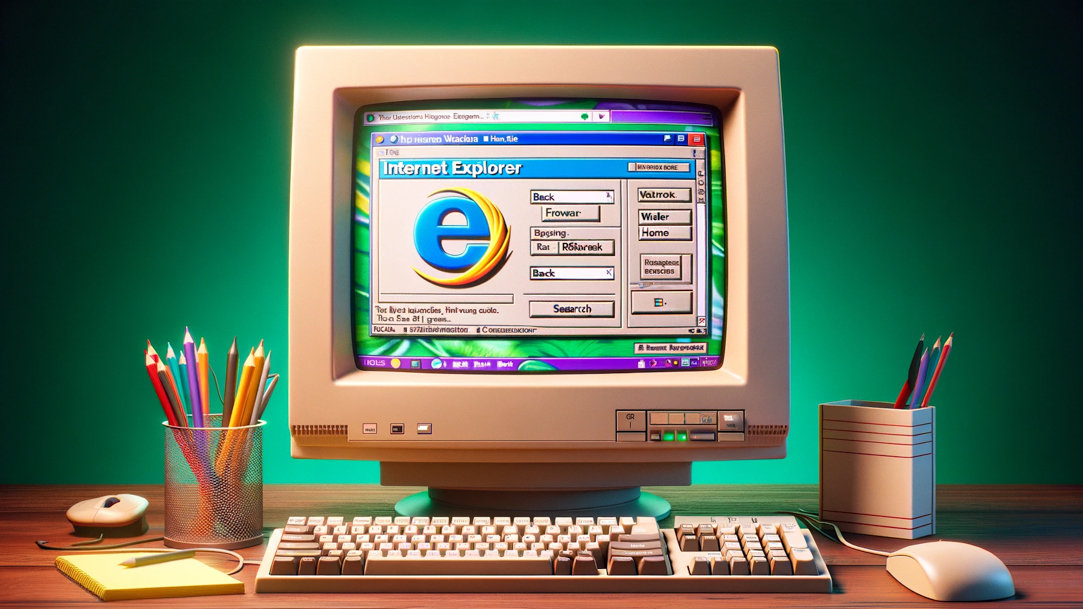
February 13, 2024
How Internet Explorer took over the early online world, and where it is today
In the history of our digital lives, the impact of Internet Explorer still resonates: It introduced millions to the internet, connecting them with their new digital lives. Although now retired, this browser forged an indelible path through the ever-evolving landscape of the internet, significantly shaping how we navigate and experience the online realm today. Explore the history of Internet Explorer and how its legacy lives on in modern browsers like Microsoft Edge.
The history of the internet
In the beginning, there was ARPANET: a project launched by research universities in the late 1960s as a means for scientists to communicate and share information. In the ensuing decades, personal computers became widely available and attainable by families and businesses. Graphical user interfaces allowed users to interact with these computers using icons and images, instead of lines of programming code.
By the early 1990s, the true democratization of the internet began with the arrival of the World Wide Web. When Microsoft launched Windows 95 on August 24, 1995, it included Internet Explorer in the Microsoft Plus! expansion pack. Just six people developed Internet Explorer in these early days, using source code licensed from a team at the National Center for Supercomputing Applications, the creators of Mosaic.

Credit: Image created with AI
How Internet Explorer became the world’s most popular browser
Windows 95 was a resounding success, becoming the world’s most popular operating system, and introducing users to iconic features such as the Start menu, the taskbar, the Recycle Bin, and Windows Explorer. Its user-friendly interface and accessibility made Microsoft a household name and solidified the personal computer as a must-have in the home and the office alike.
It evolved to introduce innovations such as support for Cascading Style Sheets (CSS) to enhance web page appearance, invisible software frameworks like ActiveX, and regular updates for improved security measures. These advancements marked significant milestones in the browser's history, shaping the way users interacted with the web. With each iteration, Internet Explorer allowed users to discover animated videos and online games, web forums, interactive web pages, personal blogs, and even the earliest social media platforms.
The evolution of Internet Explorer into Microsoft Edge
However, as the digital landscape continued to evolve, Internet Explorer faced challenges, such as more complex cybersecurity threats. The internet itself began to evolve as well: faster speeds at home led to the rise of downloading and streaming videos, music, and video games.
In 2015, the Microsoft Edge legacy browser was launched as a successor to Internet Explorer and was built with Microsoft’s proprietary browser engine, EdgeHTML and Chakra JavaScript engine. Microsoft Edge legacy was rebuilt to be Chromium-based and released to the public in 2020 and remains the current browser version today. This browser version was created entirely from the ground up, using newer technology, designed for better performance, improved security, and enhanced compatibility with modern web standards. Microsoft Edge gives users a more streamlined and contemporary browsing experience, especially when coupled with AI-powered technology like Copilot, which is built right into the browser.
In 2022, Microsoft finally gave Internet Explorer its end-of-life (EOL) cycle, ending support and updates for the long-lived browser. However, Microsoft Edge is still built into every new version of Windows 11.
Internet Explorer's legacy: user adoption and market share
From its inception, Internet Explorer significantly influenced web browsing habits. The browser maintains a considerable user base due to its compatibility with older websites and enterprise applications. As the web continues to evolve, user adoption and market share trends for Internet Explorer will likely continue to fluctuate. Nonetheless, its enduring user base and historical significance cement its place in the history of internet browsers.
The story of Internet Explorer mirrors the rapid evolution of the internet itself, and how it has impacted every aspect of our modern lives. From its inception to its evolution into Microsoft Edge, it has left an indelible mark on the digital world, shaping how we interact with and perceive the vast expanse of the internet. Try Microsoft Edge today and see how it’s designed for a seamless, AI-powered online experience.
Frequently asked questions
-
Internet Explorer is a web browser developed by Microsoft. It was a dominant web browser during the early internet era and was the default browser for Windows operating systems.
-
Internet Explorer was first launched on August 16, 1995, as part of the Plus! add-on package for Windows 95.
-
Microsoft officially ended support for Internet Explorer on June 15, 2022. Users are encouraged to transition to Microsoft Edge, its successor.
- Features and functionality subject to change.
- Articles are written specifically for the United States market; features, functionality, and availability may vary by region.
Products featured in this article

Microsoft Edge

Copilot

Windows 11
More articles

Boost search and creativity with AI in Microsoft Edge

Use Copilot in the Microsoft Edge sidebar

